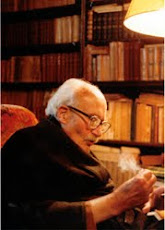Without a hierarchical structure it is not possible to transform freedom from a fable into a fact.
The liberal always discovers too late that the price of equality is the omnipotent state.
Escolios a un Texto Implícito: Selección, p. 300
September 8, 2010
Subscribe to:
Post Comments (Atom)

The original Spanish is:
ReplyDeleteSin estructura jerárquica no es posible transformar la libertad de fábula en hecho.
El liberal descubre siempre demasiado tarde que el precio de la igualdad es el estado omnipotente.
This aphorism is one for libertarians to consider. It also is reminiscent of a passage from Robert Nisbet's The Quest for Community:
ReplyDelete"It is impossible to understand the massive concentrations of political power in the twentieth-century, appearing so paradoxically, or it has seemed, right after a century and a half of individualism in economics and morals, unless we see the close relationship that prevailed all through the nineteenth century between individualism and State power and between both of these together and the general weakening of the area of association that lies intermediate to man and the State."
Nisbet, as my source for this quotation points out, was building on an insight from Tocqueville's Democracy in America. Tocqueville emphasizes the importance of voluntary associations in America (of the 1830's) because it was voluntary associations that replaced the hierarchical social relations of the past. His fear was that Americans, by abolishing intermediate (hierarchical) institutions but leaving the state intact in the name of individualism, would create a society in which any individual would always run to the state--rather than to an intermediate institution--to resolve disputes he had with his neighbor. The state would fill the vacuum left by the abolition of hierarchy in society.